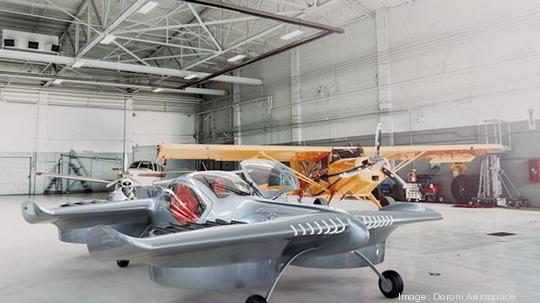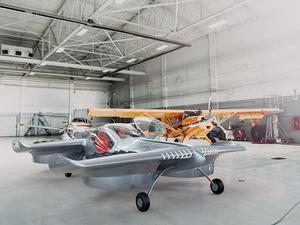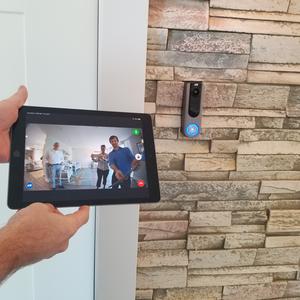
Doroni Aerospace launched a new fundraising round in its quest to bring electric aircraft to home garages by 2025.
The Coral Springs company is the maker of the Doroni H1, an electric vertical takeoff and landing (eVTOL) aircraft designed for everyday consumers. With a flying range of 60 miles per trip, the two-seat vehicle is being marketed to commuters who want to avoid traffic congestion.
After raising $3.5 million from nearly 2,000 contributors on StartEngine, Doroni is kicking off a Regulation D offering to raise additional capital from investors. The offering makes it possible for smaller companies to sell their securities to investors without having to register with the U.S. Securities and Exchange Commission.
"It's blood in the veins for us because the company needs funds to move forward, develop the prototype and get certified by the Federal Aviation Administration," CEO Doroni Merdinger told the Business Journal.
Doroni Aerospace is one of several businesses in the emerging urban air mobility market, an industry that Morgan Stanley projects could be worth as much as $1 trillion by 2040. At least half a dozen eVTOL companies have made moves to establish a presence in South Florida, with most focused on launching commercial air taxi ventures in the next two years. The tri-county region's crushing highway congestion, suburban sprawl and lack of public transit infrastructure makes it a prime market for eVTOLs, which take off vertically like a helicopter and then fly like a regular plane.
When it is commercially available, consumers will be able to fly the H1 as long as they have a valid driver's license and complete a 20-hour training course. The company operates a 13,000-square-foot research and development facility in Pompano Beach where it tests and manufactures the aircraft.
Merdinger said the company has received more than 270 pre-order requests for the H1, which is expected to retail for $250,000. Doroni Aerospace is in the process of building an updated prototype that will use lighter batteries and have a more aerodynamic design, giving the aircraft extra lift with less power.
The FAA is still developing a regulatory framework that will allow eVTOLs to get off the ground. Doroni Aerospace aims to certify its prototype as a light sport vehicle, a category of small aircraft that are simple to operate. The aircraft will fly at an altitude of only a few hundred feet, Merdinger said, so the eVTOL will not encounter airplanes and other high altitude aircraft while in route.
Piloting an aircraft may sound like an intimidating task to most commuters, but Merdinger insists anyone who can drive a car or fly a drone will be able to operate the H1. The eVTOL only goes in four directions: up, down, right and left.
The vehicles are capable of taking off and landing from anywhere with a flat street, Merdinger said. As a result, flyers will not need to rely on a network of public helipads or vertiports to travel in the H1.
"Think of it as a three-dimensional elevator," he said. "You go up, get directed to your destination, fly straight over and then descend. It's very intuitive."
For more stories like this one, sign up for Miami Inno newsletters from the South Florida Business Journal and the American Inno network.








